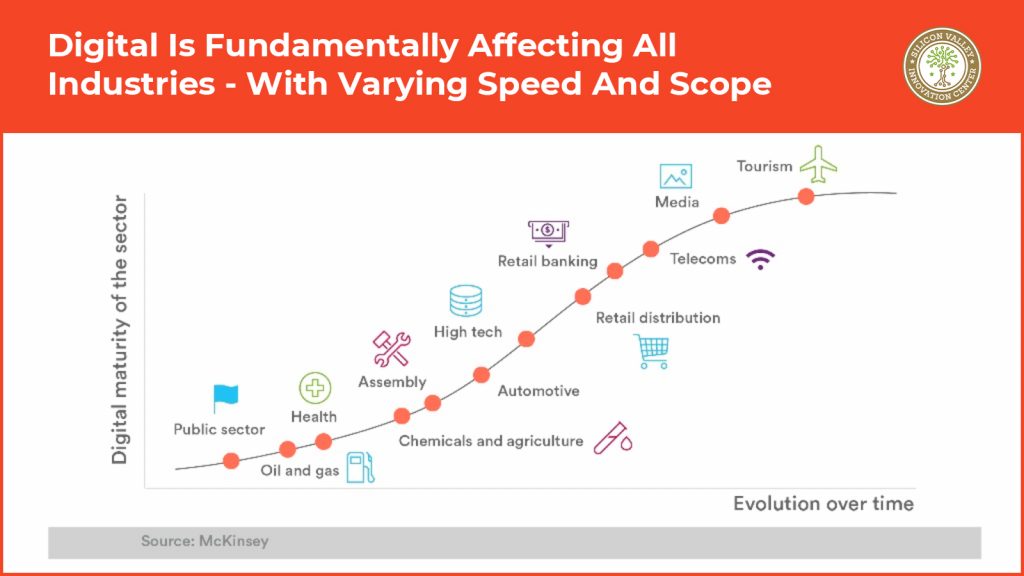The transformation of oil & gas is considered today to be in its fourth iteration, akin to the “industry 4.0” phenomenon we see across economic sector. Yet although humankind’s reliance on burning naturally occurring fuels began many centuries ago, the modern history of crude oil and natural gas extraction can be said to have begun in the period between the late 19th and early 20th centuries. It was around this time that many of the major oil and gas companies that we know today – including ExxonMobil, Royal Dutch Shell and British Petroleum – were founded.
At that time, the oil and gas industry was considered to be a technological pioneer, with new and ever-more sophisticated drilling rigs appearing regularly as companies sought to extract resources from more challenging locations and deeper waters.
Yet in recent years oil and gas has fallen behind. Whereas consumer-driven sectors such as tourism, media, and retail banking are far along the path toward digital transformation, oil and gas is regularly ranked as one of the least digitally mature parts of the economy.
Industry majors are slowly waking up to this reality, as evidenced by the fact that many have launched digital transformation programs. These initiatives, most still in their early stages, are designed to bring about change inside what are often very traditional companies with more than one hundred years of history behind them.
But legacies notwithstanding, change will inevitably come. In fact, we can already see it taking shape in two key forms: technological and cultural.
Key technologies: 5G and AI
On the technology side, 5G and artificial intelligence are set to be the most pivotal developments for the transformation of oil and gas. With 5G’s high speed and ultra-low latency, oil and gas companies will be able to communicate and share data between onshore and offshore operations more smoothly and reliably than ever before, in the process replacing wired systems with wireless ones, and increasing capabilities in remote monitoring and real-time asset management. Both are priority areas at a time when offshore drilling in ever-more exotic locations is on the rise.
What’s more, 5G technology is sure to accelerate the move by hydrocarbon extractors toward more process automation and robotics, given that 5G networks are able to deal with huge amounts of data across operational areas including logistics, supply and production.
Relatively simple, starting-point applications of AI in oil and gas include in the inspection and maintenance of physical assets, security and surveillance of assets, and optimization of plans of asset maintenance and inspection. Yet even here the industry runs into trouble, with many companies unwilling to share the data that would make these tasks viable, citing concerns over competition and cybersecurity. That’s why, as oil and gas digitization moves forward, ensuring cybersecurity will need to be a top priority. But just as important – if not more so – will be ensuring that as the technology modernizes, so does company culture.
A new cultural paradigm
The cultural aspect of digital transformation has perhaps traditionally been overlooked in favor of hype around glamorous digital technologies. But as those with experience of corporate transformation will attest, new technologies will have little impact within an organization whose practices and processes do not change to accommodate them.
The transformation of oil and gas is no exception, with the change now taking place in the industry perhaps well characterized as a shift from being reactive to being proactive. This change of mindset is driven by the availability of more data (and, increasingly, AI-generated insights) to not just business leaders but managers and engineers too. This influx of information, if used properly, allows for advances such as predicting maintenance issues as much as ten days before they appear.
But to reach that state of affairs, where the benefits of new technologies are realized in concrete cost and time savings, requires several steps. Investment in workforce training and upskilling is among them, as is the need to structure a company such that decisions made on the basis of data can then smoothly translate into the business processes that will ripple out across an organization.
That is much easier said than done, though there are templates to look to for guidance, such as the agile methodology popular in software development. Adopting similar ideas is today at the top of the agenda for many oil and gas executives who are looking for new paradigms to accompany the many new technologies that are now available to them.
Furthermore, those same executives have long realized that a new mindset is essential if the industry is to attract talent among millennials and generation Z, who have come to think of oil and gas as outdated in comparison to enterprises perceived as true ‘tech companies’, such as Google and Amazon.
Making the business case
When all is said and done, digital transformation is, ultimately, about driving better business outcomes. Hydrocarbon enterprises would do well to keep this in mind today, given the demands placed upon them to meet criteria for environmental sustainability, while at the same time weathering a downturn in which global demand for oil and gas is at best uncertain.
This problem – of needing to do more with less – is undoubtedly a tough one to face but in a world of connected devices and at the dawn of the 5G era, digital transformation offers a ready solution, for those willing to make the journey.
The oil and gas sector is going through a period of intense change. Companies in the sector, in turbulent times like these, must change too if they are to survive. Our online program for oil and gas executives teaches the practical steps for innovation, and connects program participants to leading Silicon Valley innovators. Start your journey today!
